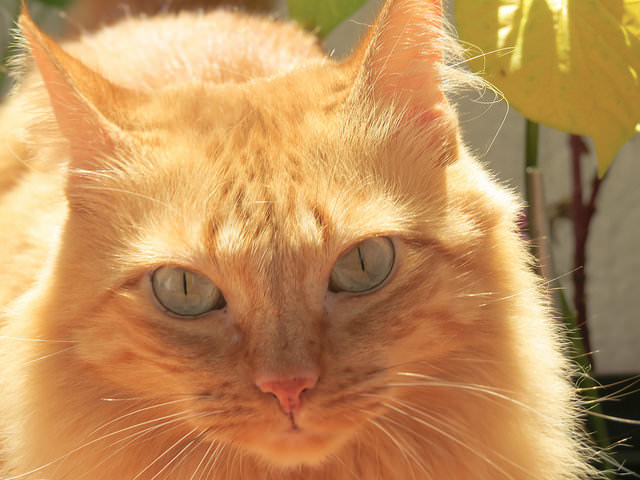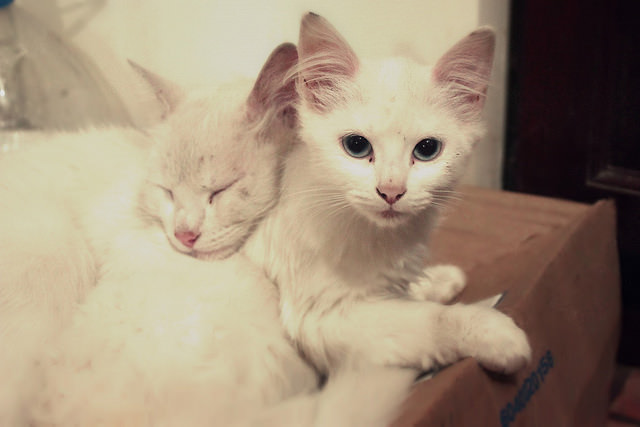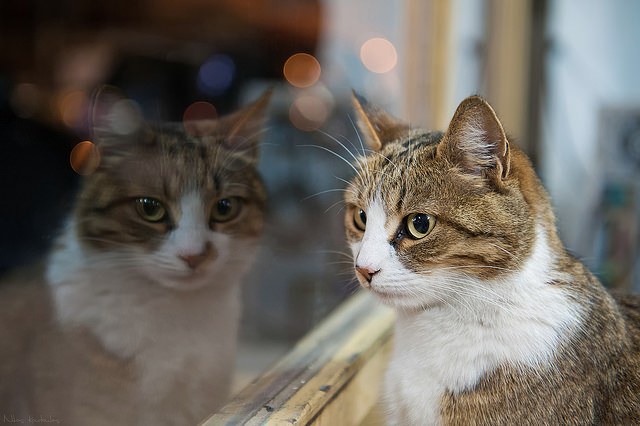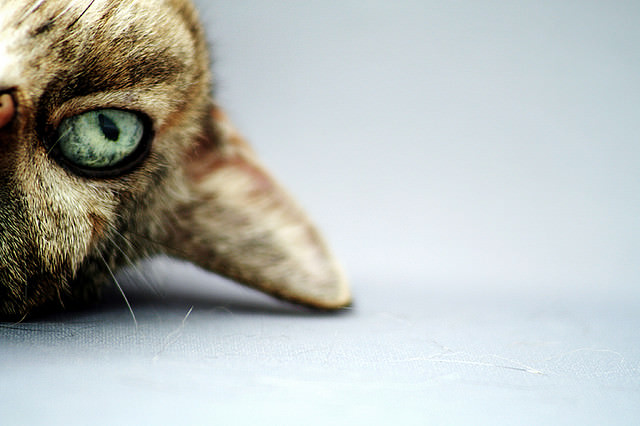Discovering that your cat has been urinating outside of his litter box is one of the most frustrating problems to encounter. Not only does it signal a behavioral or medical problem with your cat, but it can also be destructive to your home and furniture. There are many reasons why cats choose to urinate outside of the box. To make matters a bit more complicated, there’s a distinct difference between basic litter box problems and territorial marking– and they require different treatments. Since the two acts can seem so similar to the untrained eye, working to understand what your cat is trying to communicate to you (or other cats) is critical to getting him to stop.

Image Source: Ana Sofia Guerreirinho via Flickr.com
Litter Box Problems
Litter box problems drastically vary depending on the specific cat and situation. Some cats will deposit solid waste in the litter box but urinate outside of the box (or vice versa). Some will use the litter box for both but occasionally urinate outside of the box. The lack of rhyme or reason can make it even more frustrating. When your cat pees on your favorite sweater it can be hard (maybe even nearly impossible) to not feel as if he’s trying to spite you. It’s important to remember that it’s nothing personal; he’s simply trying to communicate something and it’s your job to solve the puzzle.

Image Source: Denise Coronel via Flickr.com
There are many reasons cats avoid their litter boxes.
- There may be something physically undesirable about using it.
- Do you clean it every day? Cats have very sensitive senses of smell and a dirty box can be overwhelming.
- Are you using a new type of litter? It may be too highly scented or he may not like the texture.
- Are you using the right amount of litter? Cats need enough to dig and bury their waste. Most cats like 2-4 inches of litter.
- Is the box in a good location? It should be in a fairly private and low-traffic area, yet easily accessible and decently well-lit.
- Are the sides of the box too high? A cat who is tiny, elderly, or has mobility issues may have a hard time climbing into a box with high sides.
- Elimination outside of the litter box can signal a medical issue like a urinary tract infection. A cat who has a painful medical problem may continue to urinate outside of the box even after the problem has been solved because he may associate the litter box with the pain of the infection.
- Cats can avoid the litter box because of negative associations. Just like with the pain of a urinary tract infection, cats can associate the litter box with all kinds of negative experiences. For instance, he may avoid the litter box if he was ambushed by another household animal while using it.
- A cat who is stressed out may begin eliminating outside of the litter box. Cats can become stressed by even the smallest changes to their environments. Have you had houseguests? Have you rearranged the furniture? Is your street being re-paved with noisy vehicles?

Image Source: m.shattock via Flickr.com
Basically, litter box problems can be linked to behavioral or medical problems. Something just isn’t right in his body or environment. Since litter box problems are often caused by infections, it’s a good idea to make an appointment with your veterinarian if your cat starts urinating outside of the box. Infections can get out of hand fast and it’s best to treat them as quickly as possible. Once you’ve ruled out a medical issue, you may be able to find the source of the behavior by simply assessing your home from your cat’s perspective. Note anything that has changed (houseguests, a new animal, etc.) or has become unpleasant (an unkept litter box, stress, etc.) and make the necessary changes to calm your cat.
Related: The 11 Best Cat Litter Boxes for the Purrfect Potty Experience

Image Source: Hebe Aguilera via Flickr.com
Territorial Marking
Territorial marking isn’t considered a litter box problem, even though it involves urination outside of the box. That’s because cats who mark still use their litter boxes for their regular eliminations. Territorial marking is exactly what it sounds like: a tactic cats use to claim a space as their own. Though cats do mark with urine, the urine used for territorial marking is laced with extra communication chemicals (which are also responsible for the more pungent smell). A marked surface can give a lot of information to another cats who smells it, such as how much of the territory has been claimed, how long the marking cat has been away and when he may return, and whether he is looking for a mate. Other than for mating purposes, cats generally mark because of a conflict with another cat, either within your household or with a neighborhood cat that’s been lurking outside. It’s a dependable way for them to say “Hey, this is my turf. Back off!”

Image Source: Nikos Koutoulas via Flickr.com
If you’re able to observe the act, marking will often look different than litter box problems. A cat who is having litter box problems will eliminate in a way that mimics how he’d do it in the litter box (squatting, attempting to dig and cover, etc.), but a cat who is marking will usually have a unique approach:
- Marking will often happen on vertical surfaces, such as the side of a couch or a wall.
- Marking cats will usually back up to the object and spray from an upright position. Look for an erect tail that may be twitching.
- Because of the extra communication chemicals, the urine used to mark territory will smell a lot more pungent than the urine you’ll find in the litter box.
- The quantity of urine used to mark will usually be less than what you’ll find in the litter box since he’ll still be using the litter box for bladder relief.

Image Source: d’n’c via Flickr.com
Since territorial marking is generally more straightforward than litter box problems, it can be easier to reign in if you discover that your cat has been doing it. Here are some tips:
- Spay or neuter your cat. Since cats can use marking to search for a mate, neutered and spayed cats are far less likely to do it.
- Keeping windows, blinds, and doors shut can help prevent your cat from feeling threatened by neighborhood cats.
- If you’ve got neighborhood cats lurking around, try adding a motion detector to a sprinkler system that’ll keep them a safe distance from your home (or at least away from the windows).
- Use a Feliway diffuser to disperse mock feline facial pheromones into your home. Those are the pheromones your cat emits when he’s happy and content. A diffuser can make him feel more comfortable and happy in times of stress. A diffuser will be exceptionally useful if your cat is having a conflict with another cat in your home.
